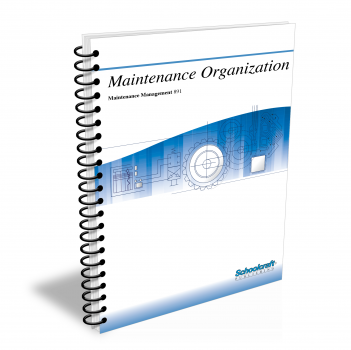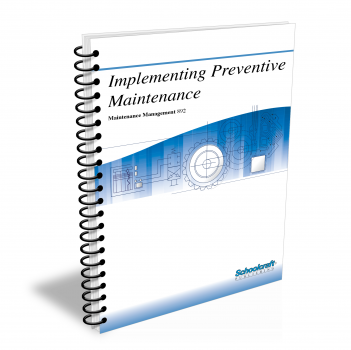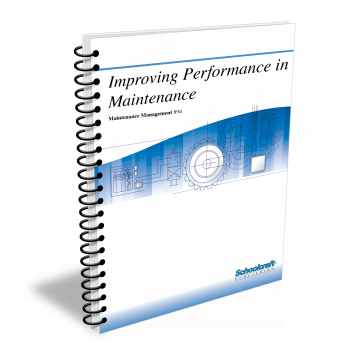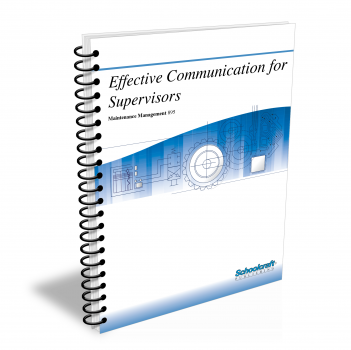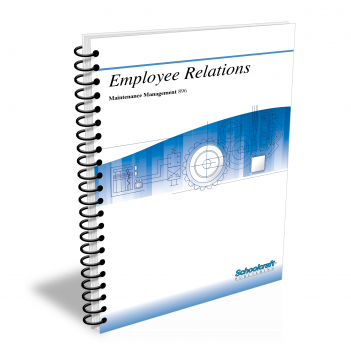Controlling Maintenance Resources
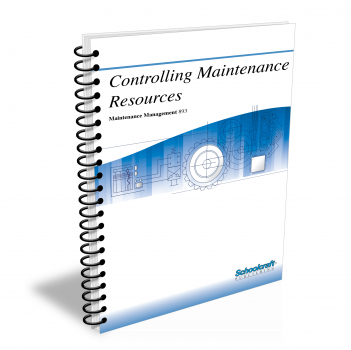
Course Number: 893
The Controlling Maintenance Resources textbook covers methods of using maintenance resources for greatest efficiency, and tells how to implement the techniques effectively. Explains what workload is and how to measure it. Provides a thorough investigation into the control of labor, parts, and materials—both in the field and in the shop. Examines the budget process and how to control costs through budgeting.
Does your curriculum require additional topics not included in this textbook? Build a customized version of the Controlling Maintenance Resources textbook below.
Recommended Contact Hours – 10
Preview a Chapter
Available Supporting Material
- Table of Contents
- Exam Copies
- Suggested Titles
Table of Contents
Chapter 1: Measuring Workload
Topics: What is the workload?; Categories of workloads; Techniques for computing workloads; Distributing the workload; Effects of absenteeism, overtime on workloads; Workloads vs. backlog levels
Learning Objectives:
- Define workload and explain its importance in control of maintenance work.
- List the seven workload categories.
- Compute workload measurements for each of the seven categories.
- Explain how the workload should be distributed.
- Describe the effects of absenteeism and overtime on the workload.
Chapter 2: Controlling Labor
Topics: Maintenance labor control; Overall control of maintenance labor; Responsibility of control; Observe and react; Handling absenteeism; Overtime vs. bringing on extra people; Planning vacation schedules; Processing vacation requests; Productivity and the supervisor
Learning Objectives:
- Identify the seven categories of maintenance labor discussed.
- Describe the most effective means of controlling each of the seven categories of maintenance labor.
- Explain the effect a well-executed PM program has on other maintenance work.
- State the leading factors contributing to absenteeism.
- Determine the breakeven point between overtime and hiring additional workers
- Schedule vacation periods so that production still proceeds smoothly.
Chapter 3: Controlling Parts and Materials
Topics: Material control; Controlling inventory; Who should control the inventory?; Administrative control of maintenance work; Duties of the material controller; Inventory control systems; Operating a manual control system; Reordering stock; Rebuilt and fabricated parts; Calculating order quantities and reorder points; The two-bin system
Learning Objectives:
- Explain the importance of effective material control to maintenance work.
- Describe the duties of the material controller.
- Describe the operation of a typical manual inventory control system.
- Calculate economic order quantities and reorder points.
- Operate a two-bin inventory control system.
Chapter 4: Managing Shop Operations
Topics: Shop control; Liaison with field work; Engineering project support; Shop rebuilds and overhauls; The shop workload; Mobile equipment maintenance; Material support; Parts and component rebuilding; Performance in the shop; Shop location, layout, and configuration; Work area considerations; Shop care and cleanup; Central shop vs. area shops
Learning Objectives:
- Describe the differences in labor control between shop and field work.
- Describe the role played by a shop that supports a field crew.
- List the steps required to rebuild parts.
- Explain how shop location, layout, and configuration affect work.
- List the advantages and disadvantages of central and area shops.
Chapter 5: Controlling Costs through Budgeting
Topics: Cutting maintenance costs; Effect of improved productivity; The structure of maintenance costs; Budgeting maintenance costs; Types of budgets used by maintenance; Key equipment in the budget; Maintenance cost reduction strategy; All work must be approved
Learning Objectives:
- Describe the effect increased productivity has on maintenance costs.
- List the uses of a budget.
- Describe zero-based budgeting.
- Describe the factored budgeting.
- List the eight steps in formulating equipment repair projections.
- Explain the reason why all maintenance work should be approved before it is performed.
Request Exam Copies
Exam Copies
Ready to see a copy of our textbooks? After selecting which textbooks you’d like to review for your course, you can submit your request by either logging in or creating an account so we know where to ship your exam copies. A representative from Schoolcraft will contact you to confirm and finish processing your request.
Exam copies are always free and yours to keep.
Selected Exam Copies
none selected
* Maximum of five copies can be ordered
